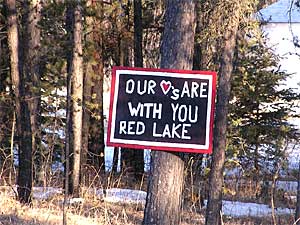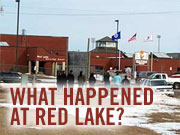April 14, 2005
 |
| A sign posted by a resident of Bemidji after the Red Lake school shootings. Racial tension between tribal members and residents of surrounding communities has been noticeable of late. (MPR Photo/Tom Scheck) |
In the past, the relationship between Red Lake residents and nearby communities like Bemidji, has sometimes been tense. There have been allegations of racism. The American Civil Liberties Union recently started a Racial Justice Project in northern Minnesota with offices based in Bemidji. Now, some people in the community say the tragedy at Red Lake might be an opportunity to bridge the racial divide.
Bemidji, Minn. — Some old timers who live in communities near the Red Lake Reservation remember baseball games, swimming and summer picnics with their Indian neighbors. In recent decades, the economic relationship has flourished, but personal relationships are often strained.
In the 1970s, Red Lake residents boycotted Bemidji businesses to protest racial discrimination. Some Indian activists threatened similar action last year, after a study showed American Indians were stopped by police at a significantly higher rate than white drivers.
Some say now is an opportunity for change. Tony Treuer, who teaches Ojibwe language at Bemidji State University, says the condolences offered to Red Lake residents are a good first step.
"But now, what do we do next?" Treuer asks. "Not just about taking a good look at the security system at the Red Lake school, but about really understanding each other, about really healing the sources of dysfunction throughout our communities -- that could leave anyone feeling like shooting people at a school is an appropriate, or only, way out."
Treuer says this is a moment in time when leaders on the reservation, and in largely white communities like Bemidji, can step forward and make a difference. He says it's a time to build lasting relationships that will have long term benefits.
Strong ties bind Red Lake and Bemidji. Red Lakers live and work in Bemidji. Bemidji residents commute to Red Lake to work in tribal government, the Red Lake hospital or the tribal casino.
Quentin Fairbanks says many of those jobs pay well. Fairbanks grew up on the Red Lake Reservation when there were few economic opportunites. He left for a career in law enforcement. He's now a retired businessman and Beltrami County commissioner.
He says the Red Lake Reservation is a critical part of the local economy.
"We're talking about $85 million to $90 million impact. About 90 percent of that is spent in Bemidji," says Fairbanks. "I would hate to see that people don't realize how much they need Red Lake. It's not just Red Lake needs the county or Bemidji, they both need Red Lake."
By some estimates, half of the money Bemidji stores take in comes from American Indians.
Beltrami County Commissioner Jim Heltzer says it's time Bemidji recognizes the contributions of Indian people.
"It would be a wonderful thing if the merchants and the Chamber of Commerce would sponsor a day or week to honor the Native Americans who shop in Bemidji," Heltzer says. "They're a tremendous economic impact on Bemidji, and we ought to recognize that and give them the honor they have due for helping support our whole economy."
Heltzer says the business community has been cool to that idea in the past. He also wants to see better cooperation between county and tribal government.
The connections are not only economic. Half of the inmates in the Beltrami County jail are American Indians from the three surrounding reservations. Heltzer says the underlying cause is often poverty or alcohol abuse. Most of the crime is alcohol-related, and many Indian inmates stay in jail because they can't afford to pay their fines.
Heltzer says Bemidji and Red Lake could work together to address many shared problems. For example, both need more affordable housing, better access to mental health care, and improved alcohol treatment programs.
Heltzer says the key is working together while respecting cultural differences. He says too often, Indian people are accepted only when they leave their culture behind.
Heltzer says he's hopeful Beltrami County commissioners and the Red Lake tribal council can begin to look for new ways to work together.
For Audrey Thayer, the change starts at a much more fundamental level. Thayer heads the American Civil Liberties Union Greater Minnesota Racial Justice Project in Bemidji. She hopes local leaders will step forward. But, she says if race relations are to improve, it's average citizens who will make the difference.
"It's the guy pumping gas, the guy changing tires, the woman looking for odd jobs, the mom taking her kids to school. It's all of us that have to step up," says Thayer. "Too often we rely on someone else to do it. I think we're in a time and place we all need to step up and become much more engaged than we think we are."
Thayer says the best place to start is to focus on the needs of kids on and off the reservation, regardless of their race or their economic status.






